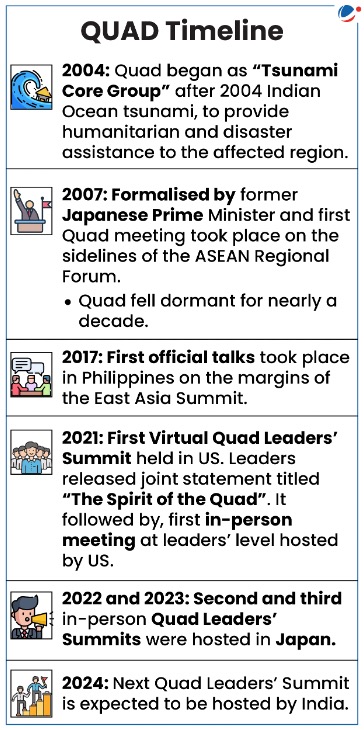Why in the news?
US House of Representatives has passed ‘Strengthen US-Australia-India-Japan Cooperation’ or Strengthening the Quad Act.
Key highlights of the Act
The act aims to strengthen joint cooperation between Quad’s four members, to promote a free, open, inclusive, resilient and healthy Indo-Pacific. Under the act:
- Quad Intra-Parliamentary Working Group: Established to facilitate closer cooperation between the US, Australia, India and Japan in the Indo-Pacific region.
- Guidelines for annual meetings and group leadership have been established.
- US Secretary of State to submit a status update on Quad’s activities and a strategy for bolstering cooperationon issues like-
- preparing for the next pandemic,
- co-developing new innovative technologies, and
- deepening economic engagement and integration.
About QUAD
- About: Quad, formally Quadrilateral Security Dialogue is a plurilateral framework comprising India, Australia, Japan, and the USA.
- Purpose: It brings together these four countries with a shared commitment to work as a force for global good and to support an open, free, and inclusive Indo-Pacific that is prosperous and resilient.
- Working: Practical work of the Quad is taken forward through following six Leader level Working Groups on following six areas.

Area | Steps taken |
Climate |
|
Critical and Emerging Technologies |
|
Cyber |
|
Health Security Partnership |
|
Infrastructure |
|
Space |
|
Significance of Quad for India
- India’s active engagement in Indo-Pacific: Through QUAD, India can project greater influence in the Indo-Pacificregion, which accounts for half of global maritime trade and over 60% of global Gross Domestic Product and strategically important for India.
- Boost to Act East: QUAD contributes to India's strategic objectives of strengthening ties with countries in East Asia and Southeast Asia, ensuring maritime security, fostering economic engagement, and promoting peace and stability in the region.
- Defence engagements: India’s bilateral security and defence ties with Australia, Japan and United States provide a significant boost to India’s military capability.
- Diverse areas of cooperation: For example, Australia, India, and Japan have announced their intention to launch a supply chain resilience initiative (SCRI).
- Bolstering bilateral cooperation: India’s bilateral relations with ‘like-minded’ countries with the backdrop of the Quad can be strengthened further through information sharing agreements, arms exchange agreements, defence ties, and much more.
- Economic advantage: Economically, the Quad will also make India a preferred destination for investment, with supply chain disruptions caused by dependence on China.
Other Quad initiatives
|
Challenges to QUAD
- Less institutionalisation: In its current form, the Quad remains relatively lightly institutionalized. It is neither a security arrangement nor a trade group which could undermine its credibility and influence.
- Seen as cold war mentality: China has criticized the Quad diplomacy as reflective of a "Cold War mentality" and an attempt to establish an "Asian NATO”.
- Maintain its unique character: Defining the Quad’s purpose as distinct from other regional groupings like ASEAN, Pacific Islands Forum, and IORA has proven to be difficult.
- Problem of delivery: Quad is criticised for its inability to effectively promote its efforts. For example, it could not deliver promised “800 million COVID-19 vaccine doses”.
India’s concerns within Quad
|
Way ahead
- Focus on regional prosperity: Quad serves as a pivotal stabilizing force in the Indo-Pacific, facilitating the evolution of an inclusive rules-based order. To achieve this, clarity on its contributions to regional prosperity and flexibility on security matters are essential.
- Augment existing organisations in region: QUAD, rather than replacing, should seek to augment other multi-laterals or regional organizations and provide an inclusive vision for cooperation.
- Engage other players: QUAD needs to proactively engage with regional partners in initiatives that resonate with their respective interests and priorities.
- Balancing clarity and ambiguity: By not explicitly highlighting traditional security concerns, such as potential Chinese military actions, the Quad can focus on areas of shared interests while minimizing the risk of direct confrontation with China.




